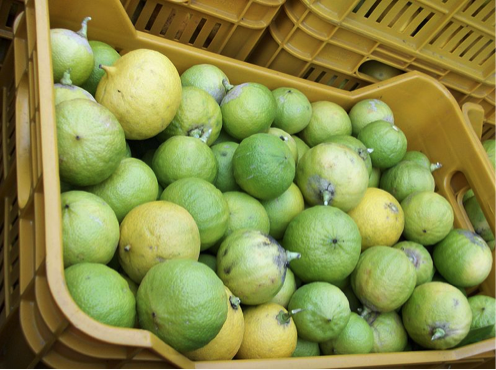Essential Oil of Bergamot, Citrus bergamia
Family: Rutacea
Origin: Italy, Reggio de Calabria has the best due to their soil and climate, Morocco, Guinea, Southern France and Côte d’Ivoire, Turkey (for making marmalade).
Plant Description: A small Tree that blossoms during the winter and has fragrant fruit the size of an orange and the color of a lemon.
Part of Plant Used: Peel of Fruit
Extraction Method: Cold Pressed (expression)
Main Chemical Constituents: The main compounds in the oil are limonene – 37.2%, linalyl acetate – 30.1%, linalool – 8.8%, γ-terpinene – 6.8% and β-pinene – 2.8%,[4] and in smaller quantities geranial and β-bisabolene.
Precautions: Photosensitization, skin irritant, not for sensitive skin, needs to be diluted. Not for use in the bath. In large doses possibly a potassium channel blocker and could cause muscle cramps
Properties: Antibacterial, antifungal, antiseptic and antiviral. Antidepressant, Nervine, Relaxant, Cephalic, Vulnerary, Stomachic, Digestive, Antispasmotic, Cordial, Carminative, Anti-inflammatory, Antiphlogistic
Mental/Emotional: Relaxing, uplifting, eases anxiety, bitterness, apathy, exhaustion, grief, tension, addiction, depression,
Nervous system: calming, stress relieving
Digestive: Improves digestion, upset stomach, flatulence, candida
Respiratory: Cough, asthma, colds, flu
Skin: Acne, healing for wounds, bug bites, psoriasis, dry eczema, insect repellent
Menstruation/reproductive/genital/urinary: Safe entire pregnancy, endometriosis, fibroids, pms, vaginal irritations, cystitis
Muscular/joint: Inflammation, sprains, spasms
Bergamot is an essential oil particularly susceptible to adulteration due to its production in relatively small quantities. It is cut with cheaper oils of bergamot mint or bitter orange or mixtures of terpenes. Bergamot essential oil is a major component of the original Eau de Cologne composed by Farina at the beginning of 18th-century Germany. The first record of bergamot oil as fragrance ingredient is 1714, to be found in the Farina Archive in Cologne. One hundred bergamot oranges will yield about three ounces (85 grams) of bergamot oil.[1] The scent of bergamot essential oil is similar to sweet light orange peel oil with a floral note.[2]
Bergaptene free bergamot is available and has no photosensitizing effects.
The term “Earl Grey” has applied to black teas that contain Bergamot essential oil as a flavoring. (From Wikipedia). Used to flavor tobacco and as a fixative scent. Primary component of the ancient remedy called Hugary water which was used as a cure for paralysis and to beautify the complexion.
References: The Complete Book of Essential Oils and Aromatherapy by Valerie Ann Worwood, The Fragrant Mind by Valerie Ann Worwood, The Aromatherapy Book by Jeanne Rose, Clinical Aromatherapy level one text, Wikipedia.
For more information about massage or aromatherapy or to create your own unique therapeutic blend, please contact Laura Jarrell at laura@jacksonvillespa.com, call 541-621-5791 or visit the Spa Jacksonville website: http://www.jacksonvillespa.com/.
